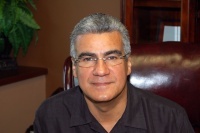c. 2008 Religion News Service
ORLANDO, Fla. _ As the Rev. Nino Gonzalez sees it, voting is like learning English or earning citizenship _ something that is fundamentally American.
So when he moved here from Puerto Rico eight years to lead Orlando’s Iglesia El Calvario and found that Hispanics were sitting out the electoral process, he resolved to do something about it.
Gonzalez spoke from the pulpit and his church-owned AM station. He rallied with Hispanics for immigration reform. He invited Florida Republicans Gov. Charlie Crist, then a candidate, and Sen. Mel Martinez to his church, prayed for them and implored them not to forget immigrants.
Today he is a rising national leader among a growing number of Hispanics who are breaking from a historically passive role in American politics _ a newfound sense of activism that could prove pivotal in the November elections.
With citizenship numbers on the rise and immigration issues in the news, Hispanics are feeling empowered to vote and are finding guidance at church _ the same place many often turn to for community, language, citizenship and other support.
“Based on what the Bible says, I feel that I need to participate in favor of those who don’t have a voice,” said Gonzalez, whose Hispanic megachurch _ the state’s second-largest _ draws some 5,500 on Sundays. “So I march with the immigrants. I participate in their rallies.”
Their numbers nudge higher with every election. In 2006, Hispanics accounted for 8.6 percent of all votes cast, up from 6 percent in 2004 and 5.5 percent in 2000, according to the Pew Hispanic Center.
Religious affiliation is a strong indicator of political affiliation. Among eligible Latino voters, evangelicals are twice as likely as Catholics to identify with the Republican Party and are even more likely to describe themselves as conservative.
Hispanics are showing their political involvement in other ways, too.
“There is the emergence of the national and religious leadership,” said Luis Lugo, director of the Pew Forum on Religion and Public Life and a native of Cuba. “What you see now is networks and organizations that are beginning to organize and mobilize the Latino evangelical/Pentecostal vote. That’s another step for Hispanics to participate in American public life.”
U.S. Catholic bishops have long been a strong voice on behalf of immigrants, and now the National Hispanic Christian Leadership Conference (an arm of the National Association of Evangelicals) is emerging as a prominent voice on behalf of non-Catholic Hispanics.
When the group emerged in 1992, early leaders never envisioned political involvement, said the group’s president, the Rev. Samuel Rodriguez. Yet today Rodriguez said he holds a “significant number” of meetings with Sens. Barack Obama and John McCain, who are courting a voting block that could prove pivotal in swing states such as California, Florida, Nevada and New Mexico.
Despite traditionally conservative leanings, Hispanics seem up for grabs in 2008, Rodriguez said. Many Hispanics harbor bitter feelings against the Republican Party over failed immigration reform.
“The Republican Party dropped the ball, and it was one of the worst exercises in political engagement that we have seen since the Republican Party similarly blew off the African-American vote in the early 1960s,” he said.
According to a Pew Hispanic Center survey this summer, Hispanic voters favor Obama over McCain by 66 percent to 23 percent.
Historically, Hispanics stayed out of politics. Many were recent immigrants and were too young to vote. That is changing, and like evangelicals generally, Hispanic evangelicals have shed their distrust for government and now embrace political involvement, Rodriguez said.
Immigration was the issue that sparked large-scale Hispanic involvement, but the dismal economy, a divisive war and dissatisfaction with the current White House likely will drive many new voters to the polls, Lugo said.
At the center of this change are pastors such as Gonzalez, a charismatic religious leader who may not understand the full weight of his influence, said Rodriguez, who has known him for at least 16 years.
“He would be categorized as one of our Rick Warrens, Bill Hybels and Joel Osteens,” Rodriguez said, referring to the emerging crop of high-profile evangelical leaders. “He is undoubtedly one of America’s most important Hispanic pastors and one of the most important pastors overall.”
(BEGIN OPTIONAL TRIM)
Gonzalez grew up in the south Bronx and Puerto Rico and eventually settled in Puerto Rico, where he worked for the Assemblies of God. In 2000, he came to Iglesia El Calvario, an Assemblies of God congregation, where attendance has doubled in the past eight years.
He said he became a pastor because he didn’t want to end up like some of his New York friends, on drugs and in jail. His church puts special emphasis on the voiceless and downtrodden by feeding the homeless and employing former criminals on its cleaning staff,” he said.
(END OPTIONAL TRIM)
Gonzalez says he doesn’t tell parishioners how to vote, only that they should vote.
“As a pastor, I believe we should participate,” he said. “I love this country. I feel we have one of the greatest countries in the world. It’s not a perfect country, but I wouldn’t change it for anything. … I just want to participate. I want to go on record, when my time passes I want it to be known there was a pastor here who did something at least.”
KRE DS END GREEN925 words, with optional trim to 825
A photo of Nino Gonzalez is available via https://religionnews.com.





